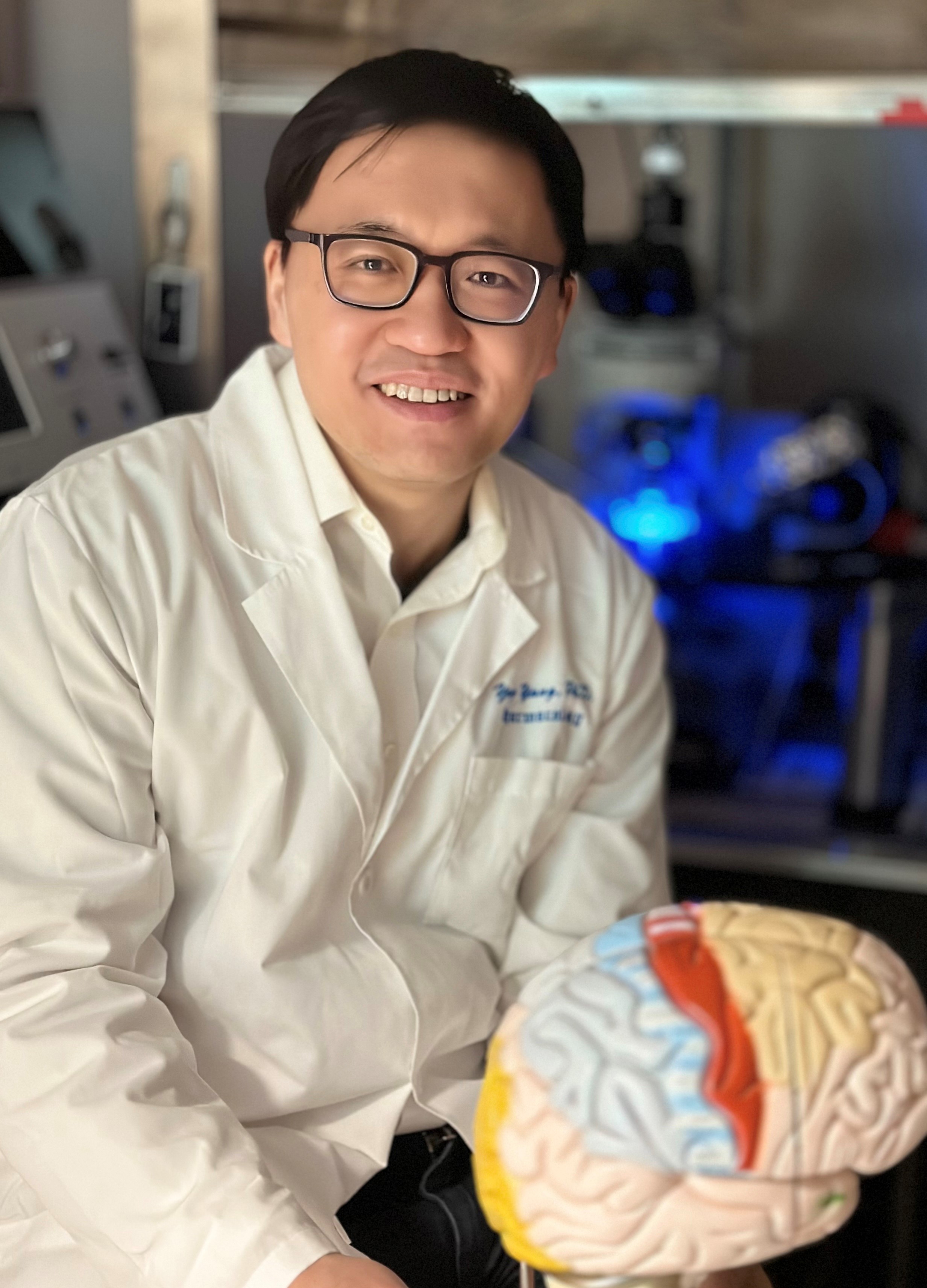
WEST LAFAYETTE, Ind. – A Purdue University researcher was awarded a $2.5 million grant from the FamilieSCN2A Foundation to support the development of personalized treatments for a group of disorders related to the SCN2A gene.
Yang Yang, associate professor of Medicinal Chemistry and Molecular Pharmacology in Purdue’s College of Pharmacy, received the inaugural Hodgkin-Huxley Research Award after peer-review by scientific experts in the field. The 5-year grant will support his research aimed at developing personalized treatments for SCN2A-related disorders, or SRDs, caused by a splice-site genetic mutation.
SRDs are a group of rare genetic conditions caused by mutations in the SCN2A gene, which encodes an ion channel that is essential for the function of brain cells. These disorders can cause a wide range of neurological symptoms, including difficult-to-control seizures, autism, developmental delays, movement disorders, and intellectual disabilities.
“With this award, we are excited to build new disease models and work on developing personalized treatments for SRDs, including cutting-edge pharmacological and genetic interventions,” Yang said. “I believe this award will help move us closer to a future where individuals with SRDs can receive treatments tailored to their specific needs.”
The Hodgkin-Huxley Research Award was funded by a single-family donation through the FamilieSCN2A Foundation, said foundation founder Leah Myers.
“We are incredibly grateful to the family who helped make this grant possible,” she said. “Through their generosity and commitment to research, this grant will help accelerate the development of personalized treatments for SRDs, a critical need for families affected by these devastating conditions.”
The Hodgkin Huxley Research Award was named to honor Nobel Prize winners Alan Hodgkin and Andrew Huxley for their innovative discovery of action potentials in neurons.
The award will contribute to the Purdue College of Pharmacy’s robust pursuit of impactful discoveries that improve lives, said Eric Barker, Jeannie and Jim Chaney Dean of Pharmacy.
“The Purdue College of Pharmacy is grateful to the FamilieSCN2A Foundation for supporting Dr. Yang’s impactful research,” he said. “We know that in situations like this, the passion for discovery is fueled by deeply personal motivations for the families involved. We are committed to advancing basic and translational research that helps move discoveries from the laboratory to directly improving patients’ lives through new therapeutic interventions.”
According to Yang, most rare diseases are genetic disorders and do not have a cure; however, recent progress in precision medicine and gene therapy are offering hope for treating these types of disorders.
The Hodgkin Huxley Award will advance precision and personalized medicine to treat these disorders and improve quality of life for the people affected by them. It will also greatly contribute to ongoing translational research within the Purdue College of Pharmacy’s Department of Medicinal Chemistry and Molecular Pharmacology, and the growing drug discovery pipeline at Purdue University, said Department Head Zhong-Yin Zhang, who also directs Purdue’s Institute for Drug Discovery.
“Dr. Yang’s research has tremendous potential to improve the lives of countless people through personalized therapies,” he said. “We are extremely grateful to the donor family and to the FamilieSCN2A Foundation for their generosity in advancing this incredibly important research.”
Yang specializes in neurological diseases, including autism, epilepsy, pain, and dementia; pharmacogenomics; and gene therapy. He is a leading investigator for the Purdue Institute for Integrative Neuroscience (PIIN), said Chris Rochet, Professor of Medicinal Chemistry and Molecular Pharmacology and the John and Donna Krenicki Director of PIIN.
PIIN is committed to unraveling mysteries of the healthy brain and advancing treatment of central nervous system disorders.
“Since arriving at Purdue in 2017, Dr. Yang has made important contributions to the field of neuroscience by discovering changes in neuron firing that account for altered brain function in individuals with epilepsy or autism spectrum disorder,” Rochet said. “We thank the FamileSCN2A Foundation for their generous investment in Dr. Yang’s research program, and offer our full support to help maximize the long-term impact of this groundbreaking study.”
The FamilieSCN2A Foundation exists to accelerate research, build community, and advocate to improve the lives of people affected by SCN2A-related disorders worldwide.
The foundation’s Chief Scientific Officer Shawn Egan said he expects Yang’s research to advance the understanding of specific SRDs.
“We expect this project to take a large leap forward into the understanding and treatment of SRDs with splice site mutations, which is an area that has been understudied to date,” he said.
To learn more about the FamilieSCN2A Foundation, visit https://www.scn2a.org/.

